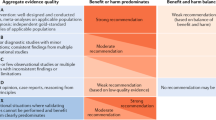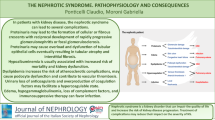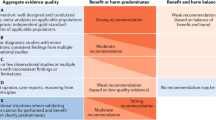Abstract
Primitive nephrotic syndrome is one of the most common glomerular diseases in childhood and represents the clinical manifestation of various pathologic changes in the kidney. In children, nephrotic syndrome is classified based on the initial response to empiric corticosteroid treatment, which is considered as the best predictor of patients’ final outcome. The advent of next-generation sequencing technology showed that genetic alterations in structural genes of the podocyte can be recognized in a significant proportion of not only familial or syndromic patients with steroid-resistant nephrotic syndrome (SRNS), but also of sporadic cases, raising the question of whether it is time to update current protocols of patient care. In this review, we discuss the implications derived from several studies describing a high prevalence in children with SRNS of pathogenic mutations in a group of genes and their unresponsiveness to immunosuppressive therapy. We propose a diagnostic and therapeutic algorithm to reduce the exposure to immunosuppressants in individuals with unresponsive forms of the disease, sparing patients the untoward side effects of prolonged ineffective treatments, and at the same time guaranteeing the optimal immunosuppressive or other new therapy in potentially responsive patients.


Similar content being viewed by others
References
Eddy AA, Symons JM (2003) Nephrotic syndrome in childhood. Lancet 362:629–639
Lovric S, Ashraf S, Tan W, Hildebrandt F (2015) Genetic testing in steroid-resistant nephrotic syndrome: when and how? Nephrol Dial Transplant. doi:10.1093/ndt/gfv355
Saleem MA (2013) New developments in steroid-resistant nephrotic syndrome. Pediatr Nephrol 28:699–709
Hall G, Gbadegesin RA (2015) Translating genetic findings in hereditary nephrotic syndrome: the missing loops. Am J Physiol Renal Physiol 309:F24–F28
Gbadegesin R, Lavin P, Foreman J, Winn M (2011) Pathogenesis and therapy of focal segmental glomerulosclerosis: an update. Pediatr Nephrol 26:1001–1015
Ehrich JMM, Brodehl J (1993) Long versus standard prednisone therapy for initial treatment of idiopathic nephrotic syndrome in children. Arbeitsgemeinschaft für Pädiatrische Nephrologie. Eur J Pediatr 152:357–361
[No author listed] (1981) International Study of Kidney Disease in Children: The primary nephrotic syndrome in children. Identification of patients with minimal change nephrotic syndrome from initial response to prednisone. A report of the International Study of Kidney Disease in Children. J Pediatr 98:561–564
Kidney Disease: Improving Global Outcomes (KDIGO) Glomerulonephritis Work Group (2012) KDIGO clinical practice guideline for glomerulonephritis. Kidney Int Suppl. 2:139–274
Hildebrandt F (2010) Genetic kidney diseases. Lancet 375:1287–1295
Haraldsson B, Nyström J, Deen WMC (2008) Properties of the glomerular barrier and mechanisms of proteinuria. Physiol Rev 88:451–487
Wiggins RC (2007) The spectrum of podocytopathies: a unifying view of glomerular diseases. Kidney Int 71:1205–1214
Lasagni L, Lazzeri E, Shankland SJ, Anders HJ, Romagnani P (2013) Podocyte mitosis—a catastrophe. Curr Mol Med 13:13–23
Becherucci F, Lazzeri E, Romagnani P (2015) A road to chronic kidney disease: toward glomerulosclerosis via dendrin. Am J Pathol 185:2072–2075
Kriz W, Shirato I, Nagata M, LeHir M, Lemley KV (2013) The podocyte’s response to stress: the enigma of foot process effacement. Am J Physiol Renal Physiol 304:F333–F347
Lasagni L, Angelotti ML, Ronconi E, Lombardi D, Nardi S, Peired A, Becherucci F, Mazzinghi B, Sisti A, Romoli S, Burger A, Schaefer B, Buccoliero A, Lazzeri E, Romagnani P (2015) Podocyte regeneration driven by renal progenitors determines glomerular disease remission and can be pharmacologically enhanced. Stem Cell Reports 5:48–63
Remuzzi G, Benigni A, Remuzzi A (2006) Mechanisms of progression and regression of renal lesions of chronic nephropathies and diabetes. J Clin Invest 116:288–296
Romagnani P, Remuzzi G (2013) Renal progenitors in non-diabetic and diabetic nephropathies. Trends Endocrinol Metab 24:13–20
Lasagni L, Romagnani P (2010) Glomerular epithelial stem cells: the good, the bad, and the ugly. J Am Soc Nephrol 21:1612–1619
Kestila M, Lenkkeri U, Mannikko M, Lamerdin J, McCready P, Putaala H, Ruotsalainen V, Morita T, Nissinen M, Herva R, Kashtan CE, Peltonen L, Holmberg C, Olsen A, Tryggvason K (1998) Positionally cloned gene for a novel glomerular protein—nephrin—is mutated in congenital nephrotic syndrome. Mol Cell 1:575–582
Boute N, Gribouval O, Roselli S, Benessy F, Lee H, Fuchshuber A, Dahan K, Gubler MC, Niaudet P, Antignac C (2000) NPHS2, encoding the glomerular protein podocin, is mutated in autosomal recessive steroid-resistant nephrotic syndrome. Nat Genet 24:349–354
Brown EJ, Pollak MR, Barua M (2014) Genetic testing for nephrotic syndrome and FSGS in the era of next-generation sequencing. Kidney Int 85:1030–1038
Trautmann A, Bodria M, Ozaltin F, Gheisari A, Melk A, Azocar M, Anarat A, Caliskan S, Emma F, Gellermann J, Oh J, Baskin E, Ksiazek J, Remuzzi G, Erdogan O, Akman S, Dusek J, Davitaia T, Özkaya O, Papachristou F, Firszt-Adamczyk A, Urasinski T, Testa S, Krmar RT, Hyla-Klekot L, Pasini A, Özcakar ZB, Sallay P, Cakar N, Galanti M, Terzic J, Aoun B, Caldas Afonso A, Szymanik-Grzelak H, Lipska BS, Schnaidt S, Schaefer F, Consortium, PodoNet (2015) Spectrum of steroid-resistant and congenital nephrotic syndrome in children: the PodoNet registry cohort. Clin J Am Soc Nephrol 10:592–600
Hinkes BG, Mucha B, Vlangos CN, Gbadegesin R, Liu J, Hasselbacher K, Hangan D, Ozaltin F, Zenker M, Hildebrandt F, Group, Arbeitsgemeinschaft für Paediatrische Nephrologie Study (2007) Nephrotic syndrome in the first year of life: two thirds of cases are caused by mutations in 4 genes (NPHS1, NPHS2, WT1, and LAMB2). Pediatrics 119:e907–e919
Gipson DS, Troost JP, Lafayette RA, Hladunewich MA, Trachtman H, Gadegbeku CA, Sedor JR, Holzman LB, Moxey-Mims MM, Perumal K, Kaskel FJ, Nelson PJ, Tuttle KR, Bagnasco SM, Hogan MC, Dell KM, Appel GB, Lieske JC, Ilori TO, Sethna CB, Fervenza FC, Hogan SL (2016) Complete remission in the nephrotic syndrome study network. Clin J Am Soc Nephrol 11:81–89
Giglio S, Provenzano A, Mazzinghi B, Becherucci F, Giunti L, Sansavini G, Ravaglia F, Roperto RM, Farsetti S, Benetti E, Rotondi M, Murer L, Lazzeri E, Lasagni L, Materassi M, Romagnani P (2015) Heterogeneous genetic alterations in sporadic nephrotic syndrome associate with resistance to immunosuppression. J Am Soc Nephrol 26:230–236
Sadowski CE, Lovric S, Ashraf S, Pabst WL, Gee HY, Kohl S, Engelmann S, Vega-Warner V, Fang H, Halbritter J, Somers MJ, Tan W, Shril S, Fessi I, Lifton RP, Bockenhauer D, El-Desoky S, Kari JA, Zenker M, Kemper MJ, Mueller D, Fathy HM, Soliman NA, SRNS Study Group, Hildebrandt F (2015) A single-gene cause in 29.5% of cases of steroid-resistant nephrotic syndrome. J Am Soc Nephrol 26:1279–1289
Büscher AK, Beck BB, Melk A, Hoefele J, Kranz B, Bamborschke D, Baig S, Lange-Sperandio B, Jungraithmayr T, Weber LT, Kemper MJ, Tönshoff B, Hoyer PF, Konrad M, Weber S, (GPN), German Pediatric Nephrology Association (2016) Rapid response to cyclosporin A and favorable renal outcome in nongenetic versus genetic steroid-resistant nephrotic syndrome. J Am Soc Nephrol 11(2):245–253
Lipska BS, Iatropoulos P, Maranta R, Caridi G, Ozaltin F, Anarat A, Balat A, Gellermann J, Trautmann A, Erdogan O, Saeed B, Emre S, Bogdanovic R, Azocar M, Balasz-Chmielewska I, Benetti E, Caliskan S, Mir S, Melk A, Ertan P, Baskin E, Jardim H, Davitaia T, Wasilewska A, Drozdz D, Szczepanska M, Jankauskiene A, Higuita LM, Ardissino G, Ozkaya O, Kuzma-Mroczkowska E, Soylemezoglu O, Ranchin B, Medynska A, Tkaczyk M, Peco-Antic A, Akil I, Jarmolinski T, Firszt-Adamczyk A, Dusek J, Simonetti GD, Gok F, Gheissari A, Emma F, Krmar RT, Fischbach M, Printza N, Simkova E, Mele C, Ghiggeri GM, Schaefer F, Consortium, PodoNet (2013) Genetic screening in adolescents with steroid-resistant nephrotic syndrome. Kidney Int 84:206–213
Vivante A, Hildebrandt F (2016) Exploring the genetic basis of early-onset chronic kidney disease. Nat Rev Nephrol 12(3):133–146
Magnasco A, Ravani P, Edefonti A, Murer L, Ghio L, Belingheri M, Benetti E, Murtas C, Messina G, Massella L, Porcellini MG, Montagna M, Regazzi M, Scolari F, Ghiggeri GM (2012) Rituximab in children with resistant idiopathic nephrotic syndrome. J Am Soc Nephrol 23:1117–1124
Ravani P, Bonanni A, Rossi R, Caridi G, Ghiggeri GM (2016) Anti-CD20 antibodies for Idiopathic nephrotic syndrome in children. Clin J Am Soc Nephrol 11(4):710–720
Hardies K, Weckhuysen S, De Jonghe P, Suls A (2015) Lessons learned from gene identification studies in Mendelian epilepsy disorders. Eur J Hum Genet. doi:10.1038/ejhg.2015.251 (Epub ahead of print)
Sampson MG, Gillies CE, Robertson CC, Crawford B, Vega-Warner V, Otto EA, Kretzler M, Kang HM (2015) Using population genetics to interrogate the monogenic nephrotic syndrome diagnosis in a case cohort. J Am Soc Nephrol. doi:10.1681/ASN.2015050504
Ashraf S, Rao J, Lawson JA, Tan W, Widmeier E, Airik M, Lovric S, Wareijko J, Sadowski CE, Pabst W, Braun D, Jairajpuri MA, Gee HJ, Lifton RP, Zenker M, Hildebrandt F (2016) Recessive mutations in 5 novel genes of interaction partners elucidate steroid sensitivity in nephrotic syndrome. In: 11th international podocyte conference, Haifa-Jerusalem, 3–6 April 2016
Acknowledgments
This article is supported by funding from the Meyer Children’s Hospital Foundation and from the Fondazione AMARTI to Paola Romagnani.
Author information
Authors and Affiliations
Corresponding author
Ethics declarations
Conflict of interest
The results presented in this review have not been published previously in whole or part, except in the abstract format. All authors declare no conflict of interest.
Ethical approval
This article does not contain any studies with human participants performed by any of the authors.
Rights and permissions
About this article
Cite this article
Becherucci, F., Mazzinghi, B., Provenzano, A. et al. Lessons from genetics: is it time to revise the therapeutic approach to children with steroid-resistant nephrotic syndrome?. J Nephrol 29, 543–550 (2016). https://doi.org/10.1007/s40620-016-0315-4
Received:
Accepted:
Published:
Issue Date:
DOI: https://doi.org/10.1007/s40620-016-0315-4




